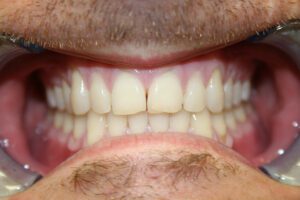 It seems that everyone in Monrovia these days wants a whiter, more beautiful smile. And who can blame them? Your smile gives you confidence and is an important part of the first impression that you make. But unfortunately, teeth darken and yellow over time due to age, eating and smoking habits, and dental conditions, causing both extrinsic and intrinsic stains. While both extrinsic and intrinsic stains can be whitened after a trip to Monrovia dentist Dr. Q for professional teeth whitening, your results may vary depending on the types of stains that you have. That’s why it’s important to know the difference between extrinsic and intrinsic tooth stains, and how professional teeth whitening affects both types of staining.
It seems that everyone in Monrovia these days wants a whiter, more beautiful smile. And who can blame them? Your smile gives you confidence and is an important part of the first impression that you make. But unfortunately, teeth darken and yellow over time due to age, eating and smoking habits, and dental conditions, causing both extrinsic and intrinsic stains. While both extrinsic and intrinsic stains can be whitened after a trip to Monrovia dentist Dr. Q for professional teeth whitening, your results may vary depending on the types of stains that you have. That’s why it’s important to know the difference between extrinsic and intrinsic tooth stains, and how professional teeth whitening affects both types of staining.
What are Extrinsic Tooth Stains?
When most people are thinking about tooth staining, they are probably thinking about extrinsic staining or the staining of the outer layer of your tooth enamel. Extrinsic staining has a variety of causes, including:
- Drinking dark beverages like red wine, colas, coffee and tea.
- Eating teeth-staining food like berries and pasta sauce.
- Smoking or chewing tobacco.
You can prevent extrinsic tooth stains by always practicing proper oral hygiene – including brushing your teeth twice and day, flossing your teeth once every day and always coming in for your 6-month dentist check-ups. You can also prevent extrinsic tooth stains by eliminating dark beverages from your diet, or drinking them with a straw to prevent exposure to your teeth, eliminate teeth-staining food from your diet and stop smoking or chewing tobacco. You can also drink water after consuming dark food or beverages, or chew sugar-free gum to remove the staining materials from your mouth.
According to Monrovia dentist Dr. Q, professional teeth whitening is highly effective on extrinsic teeth cleaning, and results may last from months to up to three years if you avoid dark colored food or beverages, using tobacco and if you practice good oral hygiene.
What are Intrinsic Tooth Stains?
Most of Monrovia dentist Dr. Q’s patients are less familiar with intrinsic stains, or stains that occur deeper within your teeth. There are a variety of causes of intrinsic stains including:
- Tiny dental fractures or cracks in your enamel, which can allow the same extrinsic staining causes to stain the interior of your tooth.
- Using tetracycline antibiotics, which can turn your teeth gray.
- Bleeding within your tooth or a pulp infection, which often requires a root canal to remedy.
- Tooth decay or weakened tooth enamel, which can allow intrinsic staining causes to penetrate deeper within your tooth.
- Too much fluoride, which is one of the reasons why you should never give fluoride toothpaste to children who are too young to spit the toothpaste out.
- Genetics, which causes a small percentage of people to have purple, gray or orange stains.
According to Monrovia dentist Dr. Q, professional teeth whitening may be able to help reduce or eliminate the appearance of some extrinsic stains. But teeth whitened due to intrinsic stains are more likely to lose their white brilliance faster than teeth that are professionally whitened due to extrinsic stains. For that reason, many Monrovia patients with intrinsic stains opt to have veneers, which are thin, white shells that fit onto the visible surface of the teeth.
I Have Questions About Teeth Whitening. What Should I Do Next?
If you have questions about professional teeth whitening and whether you have intrinsic or extrinsic stains, the best thing for you to do is schedule a consultation with Monrovia dentist Dr. Q today at (626) 599-9819. At this consultation, Dr. Q will perform a complete oral exam to determine the causes of your staining, and whether or not you are eligible for teeth whitening.

